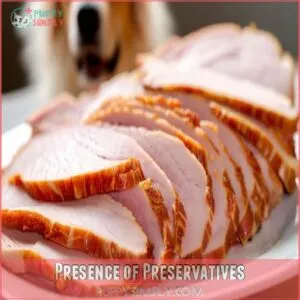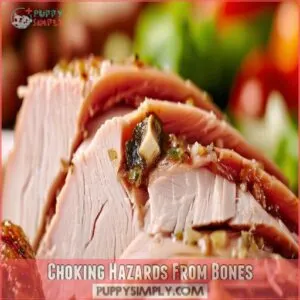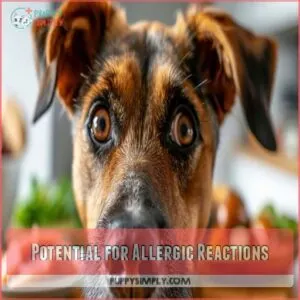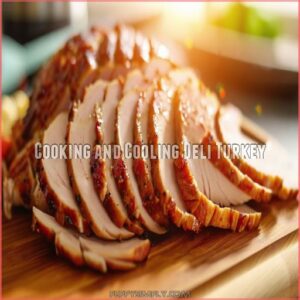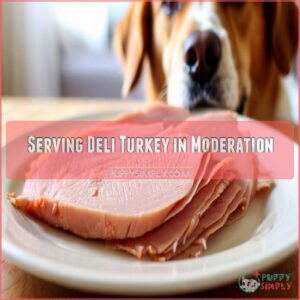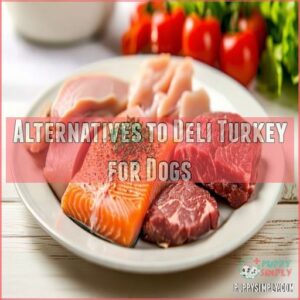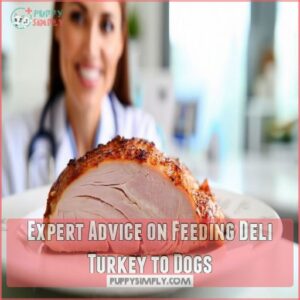This site is supported by our readers. We may earn a commission, at no cost to you, if you purchase through links.
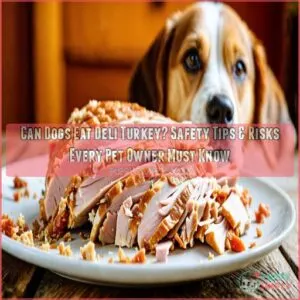 You’ll want to think twice before sharing deli turkey with those puppy-dog eyes.
You’ll want to think twice before sharing deli turkey with those puppy-dog eyes.
While plain, unseasoned turkey can be a healthy protein for dogs, deli turkey often contains excessive sodium, preservatives, and seasonings that aren’t safe for your furry friend.
Even those "low-sodium" varieties pack more salt than your dog needs.
If your pup’s begging for turkey, you’re better off cooking plain, unseasoned turkey breast at home.
Just like humans watching their processed food intake, dogs thrive on simple, wholesome proteins.
Understanding which turkey preparations are truly dog-friendly can transform your pet’s treats from potentially harmful to perfectly healthy.
Table Of Contents
- Key Takeaways
- Can Dogs Eat Deli Turkey Safely
- Is Deli Turkey Good for Dogs
- Risks of Deli Turkey for Dogs
- Preparing Deli Turkey for Dogs
- Alternatives to Deli Turkey for Dogs
- Expert Advice on Feeding Deli Turkey to Dogs
- Frequently Asked Questions (FAQs)
- Can dogs eat deli turkey?
- Can dogs eat turkey?
- Can dogs eat turkey hot dogs?
- Can dogs eat deli meat?
- Can dogs eat turkey Kibble?
- Is Thanksgiving turkey bad for dogs?
- Can dogs eat sliced deli turkey?
- What deli meat is best for dogs?
- What three meats should dogs avoid?
- Is low sodium turkey okay for dogs?
- How often can I give my dog deli turkey?
- Should puppies eat deli turkey as training treats?
- Does deli turkey cause allergies in certain dog breeds?
- Can dogs with diabetes have small amounts of turkey?
- Which deli turkey brands are safest for dogs?
- Conclusion
Key Takeaways
- While plain turkey can be healthy for dogs, you shouldn’t feed them deli turkey due to its high sodium content, preservatives, and seasonings that can cause salt poisoning and thyroid issues.
- If you want to give your dog turkey, cook plain turkey breast at home without seasonings, remove skin and bones, and serve it in small portions once it’s completely cooled.
- You’ll need to watch for signs of allergic reactions when introducing turkey, including itchy skin, vomiting, diarrhea, or excessive paw licking.
- Keep turkey treats to less than 10% of your dog’s daily calories and consult your vet before making any significant changes to their diet.
Can Dogs Eat Deli Turkey Safely
You’ll want to think twice before sharing that turkey sandwich with your pup, as deli meat often contains high levels of sodium and preservatives that aren’t safe for dogs.
While plain turkey can be a healthy protein source for your furry friend, the processed variety from the deli counter comes with specific risks you need to know about.
Nutritional Benefits of Deli Turkey
Looking to add some protein to your pup’s diet? Deli turkey packs quite a nutritional punch.
It’s loaded with lean protein that helps build and maintain your dog’s muscles.
You’ll also find essential B vitamins for brain health and energy, plus selenium to boost their immune system.
The zinc content supports enzyme function, while lower fat levels make it a smart choice for weight-conscious canines.
Potential Health Risks of Deli Turkey
While deli turkey packs a protein punch, it comes with some serious health concerns for your furry friend.
That slice of convenience can quickly turn into a risky snack.
Similar risks are also present in turkey ham for dogs, which is high in sodium and can cause digestive upset.
Here’s what you need to watch out for:
- High sodium levels can lead to salt poisoning, causing excessive thirst and even seizures
- Preservatives like nitrates may affect your dog’s thyroid function
- Hidden fat content could trigger painful pancreatitis, especially in smaller breeds
Precautions for Feeding Deli Turkey
Pet owners, before sharing deli turkey with your furry friend, take these essential precautions.
First, check the sodium content and preservatives on the label – you’ll want low-sodium options without nitrates.
Remove any visible fat and double-check for bone fragments.
Start with tiny portions to watch for allergic reactions, and stick to serving sizes no larger than a small treat.
When in doubt, consult your vet.
Is Deli Turkey Good for Dogs
Deli turkey might seem like a convenient protein source for your furry friend, but let’s get real about whether it’s actually beneficial. After checking the facts and talking with veterinarians, there are some interesting upsides to keep in mind.
- Lean protein content helps build and maintain strong muscles, keeping your pup in top shape
- However, frequent deli turkey consumption can lead to issues such as sodium toxicity risks.
- B vitamins support brain function and keep your dog’s coat looking its best
- Selenium acts as an antioxidant powerhouse, boosting your dog’s immune system
- Zinc helps with enzyme function and keeps their immune defenses strong
But here’s the thing – not all deli turkey is created equal. Think of it like choosing between a fresh, home-cooked meal and fast food. The quality matters big time. You’ll want to be picky about which deli turkey makes it into your dog’s bowl.
Risks of Deli Turkey for Dogs
While you might think deli turkey is a harmless treat for your furry friend, similar to other processed meats risks, this processed meat can pose serious health risks due to its high sodium content and harmful preservatives.
You’ll also need to watch out for hidden bone fragments that could cause choking, as well as potential allergic reactions that some dogs may experience from processed meats.
High Sodium Content
Similar to the health risks associated with hot dogs and sodium content, sodium levels in deli turkey can put your dog’s health at risk.
Just like too much salt makes you thirsty, it affects your furry friend even more intensely.
Here’s what you need to know about salt intake in deli meats:
To minimize the risk, consider consulting products specifically formulated for sodium dog food, such as those found in sodium dog food options.
| Warning Signs | Impact on Dogs |
|---|---|
| Excessive thirst | Dehydration risk |
| Frequent urination | Electrolyte imbalance |
| Vomiting | Digestive distress |
| Lethargy | Energy loss |
| Seizures | Emergency situation |
Remember, what seems like a small amount to you could be dangerous for your pup.
Presence of Preservatives
Beyond the salt content, preservatives in deli turkey pose their own set of risks for your furry friend.
Common additives like carrageenan and nitrates, while keeping the meat fresh for humans, can potentially upset your dog’s stomach or trigger more serious health issues.
These chemical preservatives have been linked to thyroid problems and changes in red blood cells, making natural, preservative-free alternatives a smarter choice.
Choking Hazards From Bones
While preservatives pose risks, bone fragments in deli turkey create an even more immediate danger.
You’ll find these tiny pieces hiding in processed meats, and they’re not always visible to the naked eye.
They’re sharp enough to cause serious internal damage or get stuck in your dog’s throat.
Even smaller fragments can scratch their digestive tract, leading to painful inflammation or bleeding.
Potential for Allergic Reactions
Like humans, your dog can develop allergies to deli turkey.
Common signs include itchy skin, vomiting, diarrhea, or excessive paw licking.
If you notice these symptoms after feeding deli turkey, your pup might’ve a food sensitivity.
Some dogs are particularly sensitive to the proteins in turkey or the preservatives used in processing.
It’s best to start with small amounts and watch for any adverse reactions.
Preparing Deli Turkey for Dogs
You’ll want to take a few simple steps to make deli turkey safer for your furry friend before serving it as a treat.
When you’re preparing deli turkey for your dog, focus on choosing low-sodium varieties and removing any potential hazards like bones or tough skin.
Choosing High-Quality Deli Turkey
Now that you know the risks, let’s pick the right deli turkey for your pup.
Start by checking the ingredients list – you’ll want turkey that’s minimally processed with no artificial additives.
Look for brands advertising "low sodium" or "no preservatives."
Natural turkey breast from your local deli counter often beats pre-packaged options since you can ask about ingredients and processing methods directly.
Removing Skin and Bones
Proper preparation of deli turkey starts with removing those potentially dangerous bits.
The skin’s high fat content can upset your pup’s tummy, while bones pose serious risks.
Here’s what you need to do:
- Carefully inspect the meat for any hidden bone fragments
- Peel off all skin, even those tempting crispy bits
- Double-check edges where small bones might lurk
Your dog’s safety is worth these extra steps!
Cooking and Cooling Deli Turkey
After removing bones and skin, cooking deli turkey thoroughly is your next safety step.
Heat it until the internal temperature reaches 165°F (74°C) to kill harmful bacteria.
Once cooked, let it cool completely before serving – hot meat can burn your pup’s mouth.
You’ll want to treat that turkey like you’d treat your own food: no shortcuts on food safety here!
Serving Deli Turkey in Moderation
When serving deli turkey to your pup, remember that moderation is key.
Keep portions small – about one slice per 20 pounds of body weight.
You’ll want to limit treats, including deli meat, to no more than 10% of your dog’s daily caloric intake.
Think of deli turkey as an occasional reward rather than a regular meal component.
This helps prevent weight gain and digestive issues.
Alternatives to Deli Turkey for Dogs
If you’re looking to skip the deli counter for your dog’s protein needs, you’ve got plenty of healthier options to choose from.
You can offer your furry friend plain cooked turkey, lean chicken, beef, or even fish – all prepared without seasonings or additives that could upset their stomach.
Cooked, Plain Turkey
Plain, cooked turkey offers peace of mind as a healthy alternative to deli meat.
You’ll want to prepare it without seasonings, oils, or butter – just pure turkey goodness.
If you’re looking for inspiration, you can find plenty of healthy dog turkey recipes online.
Remove the skin and bones carefully, then cook it thoroughly until it reaches 165°F.
Let it cool completely before serving, and chop it into bite-sized pieces.
It’s packed with protein and nutrients your pup needs, minus the additives.
Lean Cuts of Chicken and Beef
Looking to swap out deli turkey for healthier options? You can’t go wrong with lean chicken and beef for your furry friend. These protein powerhouses pack a nutritional punch without the preservatives.
- Trim visible fat from skinless chicken breasts to keep your pup’s waistline in check
- Choose lean ground beef (93% or leaner) for easy digestion
- Boil or bake meats without seasonings
- Cut portions into small, manageable bites
Fish as a Protein Source
Fish offers your pup a fantastic alternative to deli turkey, packed with omega-3 fatty acids for a healthy coat and brain function.
For more information on fish-based proteins like salmon, consider best meats for dogs, which can provide a nutrient-rich diet.
You’ll want to stick with cooked salmon, tuna, or whitefish – just make sure it’s thoroughly deboned.
Some dogs might’ve fish allergies, so start with small portions and watch for reactions.
Remember to skip seasonings and serve it plain, prioritizing wild-caught options when possible.
Natural Jerky Treats
Natural jerky treats offer a tasty alternative to deli turkey, but you’ll want to choose carefully.
Stick with brands specifically made for dogs – they’re usually free from harmful additives and nitrates.
When selecting jerky, check the ingredient list for single-source protein and avoid treats with artificial preservatives.
Always supervise your pup while they enjoy their jerky to prevent choking, and start with small pieces to test tolerance.
Expert Advice on Feeding Deli Turkey to Dogs
You’ll want to talk with your veterinarian before adding deli turkey to your dog’s diet, as they can provide personalized guidance based on your pet’s health needs.
Deli turkey as an occasional treat, your vet can help you determine the right portion size and frequency while watching for any signs that your dog isn’t tolerating it well.
Consulting With a Veterinarian
Before swapping your pup’s regular treats for deli turkey, schedule a chat with your vet.
They’ll help you understand how this protein fits into your dog’s unique dietary needs, especially if your furry friend has food allergies or pre-existing conditions.
Think of your vet as your pet’s personal nutritionist – they’ll guide you through safe portions and frequency, keeping your dog’s tail wagging and health in check.
Monitoring for Adverse Reactions
Watch your pup closely after introducing deli turkey to their diet.
Signs of digestive upset like vomiting or diarrhea warrant an immediate call to your vet.
Keep an eye out for allergic reactions, including skin irritation or respiratory issues.
Some dogs might show behavioral changes like lethargy or excessive scratching.
When in doubt, it’s better to play it safe and contact your veterinarian right away.
Avoiding Overfeeding and Obesity
Overfeeding deli turkey can quickly pack extra pounds on your pup.
You’ll want to limit treats, including deli meat, to no more than 10% of their daily calorie intake.
Consider healthier alternatives like Turkey dog snacks to satisfy your dog’s cravings.
If you’re using turkey as a training reward, cut it into tiny pieces – your dog will be just as excited for a small morsel.
Remember to adjust their regular meals when treating them with deli turkey.
Prioritizing a Balanced Diet
While portion control matters, your dog’s overall diet needs careful planning.
Think of it like building a balanced meal plan – deli turkey should be just a small part of the picture.
Here’s what a well-rounded diet should include:
- High-quality commercial dog food as the foundation (80-90% of calories)
- Fresh protein sources like plain turkey (10-15%)
- Vet-approved supplements when needed (0-5%)
Focus on consistency and variety within these guidelines.
Frequently Asked Questions (FAQs)
Can dogs eat deli turkey?
Deli turkey isn’t recommended for dogs due to high sodium and preservatives.
Plain, cooked turkey meat without seasonings is a better choice for dogs.
Always remove bones and skin first.
Can dogs eat turkey?
Like a loving mom’s home cooking, plain turkey can be a healthy treat for your dog.
Just skip the skin, seasonings, and bones – they’re dangerous.
Stick to small portions of unseasoned, cooked meat.
Can dogs eat turkey hot dogs?
Turkey hot dogs contain unhealthy additives like sodium nitrate and toxic dog food ingredients. Turkey hot dogs aren’t safe for your dog due to high sodium, nitrates, and artificial additives. If you want to treat your pup, stick to plain, unseasoned turkey meat instead.
Can dogs eat deli meat?
While your pup might beg for a taste, it’s best to avoid feeding deli meats.
They’re packed with salt, preservatives, and seasonings that can harm your dog’s health.
Stick to plain, unseasoned meats instead.
Can dogs eat turkey Kibble?
Yes, dogs can eat turkey kibble as it’s specially formulated for their nutritional needs.
It’s a safer alternative to table scraps, providing balanced protein and nutrients without harmful seasonings or additives in regular turkey.
Is Thanksgiving turkey bad for dogs?
Despite wanting to share your feast, most Thanksgiving turkey isn’t safe for dogs.
Seasonings, butter, and oils can be toxic.
If you’re sharing, stick to plain, unseasoned meat without skin or bones.
Can dogs eat sliced deli turkey?
Deli turkey isn’t ideal for your dog due to high sodium and preservatives.
Plain, unseasoned pieces of turkey can be given as an occasional treat.
Watch for signs of digestive upset.
What deli meat is best for dogs?
Plain, home-cooked chicken breast is your best choice for dogs.
While turkey and lean beef can work, they’re often high in sodium.
Skip processed meats altogether and stick to unseasoned, well-cooked options.
What three meats should dogs avoid?
Studies show 78% of dog owners unknowingly feed harmful meats. You’ll want to keep your furry friend away from raw pork (parasites), bacon (too much salt), and processed ham (dangerous additives).
Is low sodium turkey okay for dogs?
While low-sodium turkey is better than regular deli meat, it’s still best to limit portions.
You can offer small amounts as an occasional treat, but watch for added preservatives that aren’t great for your pup.
How often can I give my dog deli turkey?
You shouldn’t make deli turkey a daily treat – limit it to once or twice a month as an occasional snack.
Even low-sodium options can upset your pup’s stomach when served too often.
Should puppies eat deli turkey as training treats?
Deli turkey isn’t suitable for puppy training treats due to high sodium and preservatives.
Puppy training treats should instead be small pieces of plain, cooked turkey breast or commercial puppy treats designed specifically for training purposes.
Does deli turkey cause allergies in certain dog breeds?
Any dog breed can develop allergies to turkey proteins, though it’s not breed-specific.
Watch for signs like itching, digestive issues, or skin problems.
Best to introduce new foods slowly and monitor your pup’s reaction.
Can dogs with diabetes have small amounts of turkey?
Diabetic dogs should avoid deli turkey due to its high sodium content, which can affect blood sugar levels.
Plain, unseasoned cooked turkey breast in small portions can be considered after consulting your vet.
Which deli turkey brands are safest for dogs?
While a million brands claim to be dog-friendly, you’re better off skipping deli turkey altogether.
If you must feed it, choose low-sodium brands like Boar’s Head All-Natural or Applegate Organics, served sparingly.
Conclusion
While sharing lunch meat with your pup might seem like a loving gesture, the risks of feeding dogs deli turkey outweigh the rewards.
If you’re wondering "can dogs eat deli turkey," the answer is clear – it’s best to avoid it.
Instead, opt for plain, home-cooked turkey breast without additives or seasonings.
Keep your furry friend healthy by choosing fresh, lean proteins and consulting your vet about the best treats for their specific dietary needs.




